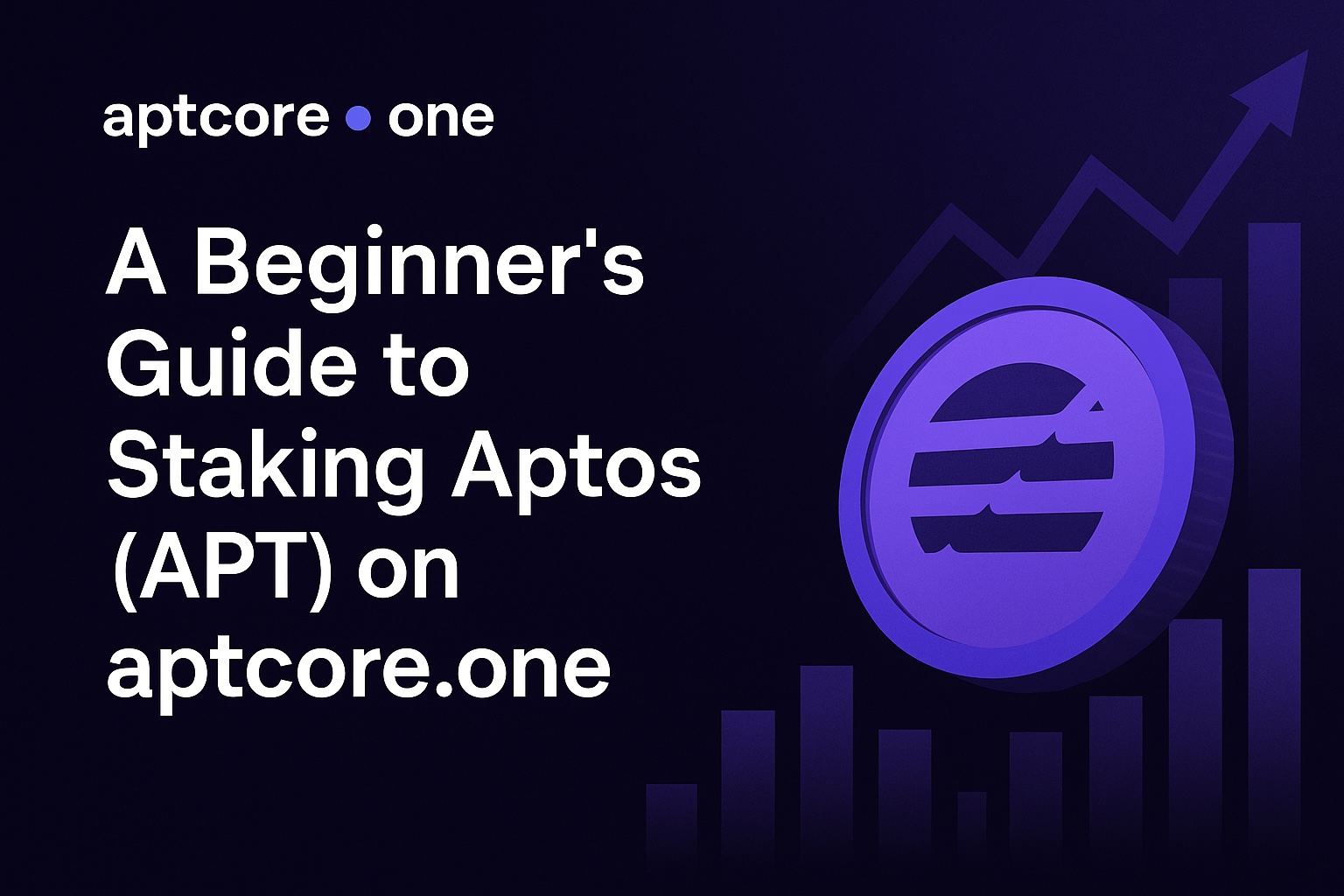A Beginner's Guide to Staking Aptos (APT) on aptcore.one

Getting Started with Aptos (APT) Staking
Welcome to the world of Aptos staking! If you're holding Aptos (APT) tokens and want to make them work for you, staking is an excellent way to earn passive rewards while contributing to the security and efficiency of the Aptos network. This guide will walk you through the essentials.
What Exactly is Staking?
In the context of Proof-of-Stake (PoS) blockchains like Aptos, staking involves locking up your cryptocurrency tokens to support the network. Stakers (or delegators, if you're assigning your stake to a validator) help validate transactions and create new blocks. In return for this service, the network rewards participants with additional tokens.
Think of it like earning interest in a savings account, but instead of a bank, you're supporting a decentralized blockchain.
Why Stake Your Aptos (APT) Tokens?
Staking APT offers several attractive benefits:
- Earn Passive Rewards: This is the primary motivation for many. By staking your APT, you'll receive regular staking rewards, increasing your overall APT holdings over time.
- Support Network Security: Staking plays a crucial role in maintaining the integrity and security of the Aptos blockchain. The more tokens staked, the more secure the network becomes against potential attacks.
- Contribute to Decentralization: By delegating your stake to various validators, you help distribute the network's consensus power, promoting decentralization.
- Low Barrier to Entry: Unlike mining, staking doesn't require expensive hardware. You can start with a relatively small amount of APT. It's always a good idea to check the current minimum staking amount required by the Aptos network or your chosen validator.
How Does Aptos Staking Work?
Aptos uses a Delegated Proof-of-Stake (DPoS) model. This means:
- Validators: These are nodes responsible for validating transactions and producing blocks. They run specialized hardware and software. To become a validator, a significant amount of APT must be staked.
- Delegators: Token holders (like you!) can "delegate" their APT to a chosen validator. You're essentially lending your staking power to that validator. You retain full ownership of your tokens; the validator cannot access or spend them.
- Rewards & Commission: Validators earn rewards for their service. They then distribute a portion of these rewards to their delegators, after taking a small commission for their operational costs and efforts.
Staking with aptcore.one: Simple & Secure
At aptcore.one, we aim to make the process of staking Aptos maximally simple, transparent, and secure.
For a visual step-by-step walkthrough of staking your APT with Petra Wallet on our platform, check out our video guide:
Here's a general overview of how to stake with us:
- Get an Aptos-Compatible Wallet: You'll need a wallet that supports Aptos, such as Petra Wallet (featured in our video), Martian Wallet, Pontem Wallet, or others. Crucially, remember to securely store your wallet's seed phrase or private keys and never share them with anyone! Your security is your responsibility.
- Acquire APT Tokens: Purchase APT tokens on a cryptocurrency exchange if you don't already have them. Transfer them to your Aptos wallet.
- Visit aptcore.one: Navigate to our staking platform using the link aptcore.one.
- Connect Your Wallet: Use the wallet connection option on our site.
- Choose to Stake: Find the staking section and input the amount of APT you wish to delegate to our validator pool.
- Confirm the Transaction: Approve the staking transaction in your wallet.
Once confirmed, your APT will be staked, and you'll start accruing rewards! You can monitor your stake and rewards directly on the aptcore.one dashboard.
What to Consider Before Staking:
- Validator Choice: Research validators thoroughly. Look at their uptime history, commission rates, community involvement, security practices, and overall reputation within the Aptos ecosystem.
aptcore.oneis committed to providing a reliable and competitive service with full transparency.- Uptime: Consistent high uptime (e.g., >99%) is crucial. It indicates the validator is reliably online to process transactions and earn rewards. Frequent downtime can lead to missed rewards for both the validator and its delegators.
- Commission Rates: This is the percentage of staking rewards the validator retains for their operational costs and services. While a lower commission might seem attractive, it's important to balance this with the validator's reliability, security, and active contributions to the Aptos community.
- Community Involvement & Reputation: A validator المرضي (active) in the community, offering support, educational resources, or tools, often demonstrates a stronger commitment. Check their official channels, social media presence, and what other delegators say about them.
- Lock-up Periods & Unbonding: When you decide to unstake your APT, there's an "unbonding" period. The exact duration of this period, and whether staking rewards continue to accrue during this time, are determined by the Aptos network's current parameters. It is essential to verify the most up-to-date information directly from official Aptos documentation, reputable Aptos block explorers, or your chosen validator before you stake. During this unbonding phase, your tokens are locked and typically do not earn new rewards, before becoming fully withdrawable to your wallet. Understanding these conditions is key to managing your staked assets.
Ready to Start Your Staking Journey?
Staking is a powerful way to participate in the Aptos ecosystem and potentially grow your APT holdings. We invite you to head over to aptcore.one, connect your wallet, and explore staking with us.
If you have any questions or need assistance, don't hesitate to reach out to our support team or join our community channels for guidance. Happy staking!